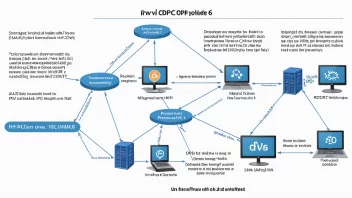What are Network Protocols?
Network protocols are defined rules and conventions for communication between network devices. They enable data exchange over a network by ensuring that devices follow a common set of guidelines, much like how people use a common language to communicate. Protocols can vary in function and complexity, but they play a crucial role in ensuring seamless connectivity and data integrity across networks.
Why are Network Protocols Important in Telecommunications?
Network protocols are essential in telecommunications because they facilitate the transfer of data between devices, ensuring compatibility and communication efficiency. They help manage data traffic, control error detection and correction, and establish connection parameters to optimize transmission speed and reliability. Without these protocols, devices would struggle to communicate, leading to data loss and network failures.
What are the Different Types of Network Protocols?
- Transmission Control Protocol (TCP): A fundamental protocol that ensures reliable transmission of data.
- Internet Protocol (IP): Responsible for addressing and routing packets of data across networks.
- User Datagram Protocol (UDP): A simpler protocol that allows faster data transmission without error correction.
- HyperText Transfer Protocol (HTTP): Used for transferring web pages on the internet.
- File Transfer Protocol (FTP): Facilitates the transfer of files between computers on a network.
How Do Network Protocols Ensure Data Integrity?
Network protocols incorporate mechanisms such as checksums and acknowledgments to maintain data integrity. When data is sent over a network, protocols like TCP include checksums to verify that the data has not been altered during transmission. If an error is detected, the protocol will request retransmission of the corrupted data, thus ensuring that the recipient receives accurate information.
What is the Role of Network Protocols in Security?
Network protocols also play a vital role in securing communications. Protocols such as Secure Sockets Layer (SSL) and Transport Layer Security (TLS) encrypt data during transmission, preventing unauthorized access and ensuring privacy. These security protocols are critical for protecting sensitive information, especially in telecommunications where personal and financial data may be transmitted.
How Do Network Protocols Facilitate Internet Communication?
Network protocols are the backbone of internet communication. They define how data packets are formatted, transmitted, and received. For example, when a user accesses a website, the browser uses HTTP to request data from a server. The server responds using TCP/IP to ensure that the data is sent reliably and accurately. This standardized communication process allows millions of devices to connect and share information seamlessly.
What Challenges Do Network Protocols Face?
Despite their importance, network protocols face several challenges, including:
- Interoperability: Ensuring different devices and systems can communicate effectively.
- Latency: Minimizing delays in data transmission, which is crucial for real-time applications.
- Scalability: Adapting to increasing numbers of users and devices without compromising performance.
Can Network Protocols Evolve Over Time?
Yes, network protocols can and do evolve to meet changing technology and user needs. For instance, the transition from IPv4 to IPv6 was necessary to accommodate the growing number of devices connected to the internet. Regular updates and new protocols are developed to address security vulnerabilities, improve performance, and support new applications.
Conclusion
Network protocols are essential for efficient and secure telecommunications. By standardizing how devices communicate, they ensure data integrity, security, and interoperability across networks. As technology continues to advance, so will the protocols that underpin our digital communications, making it vital to understand their role in our connected world.






